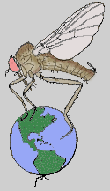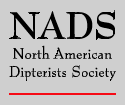1st International Congress of Dipterology
Budapest, 1986
Resolutions of the First International Congress of Dipterology (moved on behalf of the
Resolutions Committee by Dr. Graham Griffiths, seconded by Dr. Milan Chvala)
WHEREAS
Flies, Diptera, are a large and a large and diverse group of insects important as agents of pollination,
natural enemies of pests, scavengers, experimental organisms in biology and medicine, and also as pests and
transmitters of diseases; and
WHEREAS
There is an urgent need to scientifically study all forms of Diptera to better understand
their function in this World:
BE IT RESOLVED
1. That this Congress sincerely thanks the Biological Section of the Hungarian Academy
of Sciences, Dr. Tibor Jermy and all members of the Organizing Committee for their hospitality and
efficient organization of this First International Congress of Dipterology.
2. That this Congress authorizes Dr. Ludovit Weismann of the Slovac Academy of
Sciences to organize the Second International Congress of Dipterology in Bratislava in 1990.
3. That this Congress appoints a Council for International Congresses of Dipterology
responsible for providing continuity and direction for the International Congresses of Dipterology with
the following membership:
Dr. G.C.D. Griffiths (Canada) - Chairman
Dr. M. Chvala (Czechoslovakia) -Vice Chairman
Dr. F. C. Thompson (USA) - Secretary
Dr. I. Bock (Australia)
Dr. D. J. de C. Henshaw (UK)
Dr. I. M. Ipe (India)
Dr. H. Kurahashi (Japan)
Dr. L. Papp (Hungary)
Dr. R. Rozkosny (Czechoslovakia)
Dr. C. W. Sabrosky (USA)
Dr. H. Ulrich (West Germany)
Dr. G. C. Unnithan (Kenya)
Dr. V. Zaitzev (USSR)
4. That this Congress instructs the above Council to adopt a constitution modelled
on the constitution of the Council for International Congresses of Entomology within one year.
5. That this Congress urges all agencies employing or funding dipterists to support
the preparation of regional catalogs, monographs and faunal works, including the Biosystematic Database of
the Flies of the World, the Catalogue of Palaearctic Diptera, Catalogue of the Diptera of the Americas South
of United States, the Catalogue of Diptera of Australian/Oceanian Regions, Die Fliegen der Palaearktischen Region,
The Flies of the Nearctic Region, and the Manual of Nearctic Diptera.
6. That this Congress deplores the considerable gaps in information on tropical Diptera
and urges governments. funding agencies and workers on Diptera to make concerted efforts to remedy this
situation.
2nd International Congress of Dipterology
Bratislava, 1990
Resolutions of the Second International Congress of Dipterology
BE IT RESOLVED
1. That this Congress sincerely thanks the Slovak Academy of Sciences, Comenius
University and the Slovac Entomological Society, especially Dr. Ludovit Weismann, Dr. Rudolf Rozkosny,
Dr. Ladislav Jedlicka and other members of the Organizing Committee, for their hospitality and efficient organization
of this Second International Congress of Dipterology.
2. That this Congress authorizes Dr. Stephen Marshall of the University of Guelph to
organize the Third International Congress of Dipterology in Guelph, in 1994.
3. That this Congress instructs the Council for International Congresses of Dipterology
to seek membership in the International Union of Biological Sciences.
WHEREAS
Names are the basis of all communications:
BE IT RESOLVED
4. That this Congress recognizes the importance and the need for stabilizing the names of Diptera,
endorses the principle of "Lists of Names in Use", and instructs the Council for International Congresses of
Dipterology to establish a committee on Diptera Names for the purposes of preparing lists of Diptera names in
use for approval by subsequent Congress and providing advice and consent to the International Commission on
Zoological Nomenclature.
WHEREAS
The Diptera are extremely diverse (at least 100.000 species worldwide), are highly
important as bioidicators, bioregulators, and components of nutrition webs and food chains, and many species are
endangered by modern human activity (even in manmade as well as natural ecosystems):
BE IT RESOLVED
5. That this Congress recognizes habitat conservation as the highest priority and recommends
the initiation and support of long term baseline studies of Diptera in various ecosystems, the consideration
of Diptera in evaluating sites for nature conservation and the training personnel and provision of financial
support for this work.
3rd International Congress of Dipterology
Guelph, 1994
Resolutions of the Third International Congress of Dipterology
WHEREAS
More than 300 dipterists from throughout the World convened at the 3rd International
Congress of Dipterology in Guelph:
BE IT RESOLVED
1. That this congress sincerely thank Drs S. A. Marshall,
Terry Wheeler, and the other members of the organizing committee for making the Congress a success and
the University of Guelph for hosting the Congress and providing its facilities. Appreciation is also extended
to the Natural Seiences and Engineering Research Council of Canada, the other institutional and society sponsors,
and the various commerical sponsors for their contributions.
WHEREAS
The importance of maintaing biological diversity on a world wide basis cannot be underestimated and whereas
Diptera is the most diverse group of organisms:
BE IT RESOLVED
2. That the 3rd International Congress of Dipterology direct the Council for the
International Congresses of Dipterology to support all efforts by the International Union of Biological
Sciences to use every avenue to persuade countries to put in place laws and regulations for the protection
and sustainable use of their respective ecosystems as well as to educate countries and organizations of the
unquestionable significance of Diptera and their use in biodiversity research, assessment and use.
WHEREAS
The importance of Diptera as pollinators and as otherwise beneficial anthophi lous insects is recognized
and WHEREAS
The importance of floral and similar food sources to Diptera is also recognized:
BE IT RESOLVED
3. That this Congress instruct the Council for International Congresses of Dipterology to establish
a committee to create an electronic database (in the public domain) in which data on relations between Diptera species
and associated flowers be collated, with the activity details of the flies.
4th International Congress of Dipterology
Oxford, 1998
Resolutions of the Fourth International Congress of Dipterology
WHEREAS
The Diptera, or Flies, is one of the largest orders of insects with more than 140 currently
recognized families, encompassing more than 120,000 named species and probably many times that
number of, as yet, undetermined species. This is an extremely diverse group in terms of morphology,
ontogeny, diets and habitats, and includes both beneficial and pest species of medical, economic and
environmental importance, as well as laboratory animals essential for basic biological research in
many disciplines:
and WHEREAS
Systematics is the key to understanding biodiversity and many of the problems of applied entomology.
Collections, most of which have been in the public trust for 100 or more years, form the
material basis for systematic work, in both routine identifications and primary research, but they are
only accessible to science if they are properly curated:
and WHEREAS
Identification of Diptera even to family level requires special knowledge, this can only be acquired
by long and extensive experience of dipteran systematics. Therefore, all curation of Diptera collections
should be supervised by dipterists of professional standing:
BE IT RESOLVED
1. That managing and governing bodies of publicly funded museums and research institutes are
urged to fulfil their responsibilities to maintain and develop important collections of Diptera, and the associated
libraries, by ensuring:
a. That sufficient staff are employed to maintain adequately public collections of Diptera.
b. That important public collections of Diptera are curated by professional scientists trained
in the study of Systematics and Diptera.
c. That assessment of the status of Diptera collections and the scientists employed for their
curation in any situation include a recognized dipterist on the review panel.
d. That curators of public Diptera collections receive adequate funding to train junior dipterists
as their assistants, and thus ensure continuity in the Standard of curation.
5th International Congress of Dipterology
Brisbane, 2002
Resolutions of the Fifth International Congress of Dipterology
BE IT RESOLVED
1. That the Council and the delegates to the Fifth International Congress of Dipterology,
at the final plenary session of the Congress held on 4 October 2002, have noted, with concern, the recent
decline in natural science research capacity in South African museums. As a body of scientists committed to
the promotion of biodiversity conservation through research excellence and enhanced public understanding of
science, we urge the South African Government and Dr Ben Ngubane in particular, as Minister of Arts, Culture,
Science and Technology, to do all within their power to reverse this trend. ln this regard, we view the recently
proposed South African Biosystematics Initiative as an insightful development, which promises to revitalise this
chronically underresourced sector. We wholeheartedly endorse this initiative and urge the South African Government
to provide the support necessary to make it a reality.
2. At the same time, we are concerned that governmental support for natural science
museums in South Africa has dwindled alarmingly. lf the current crisis in capacity is to be reversed, then
the South African Government must be prepared to fund the institutions concerned more realistically. We, therefore,
respectfully ask that this issue be given serious consideration, and we request that the Department of Artsand
Culture be tasked with reviewing the governance and funding of natural science museums, in the light of the broader
responsibilities of the Ministry of Arts, Culture, Science and Technology.
|
First published on the Internet on 30 September 2014
J.E. O'Hara |
| | |




